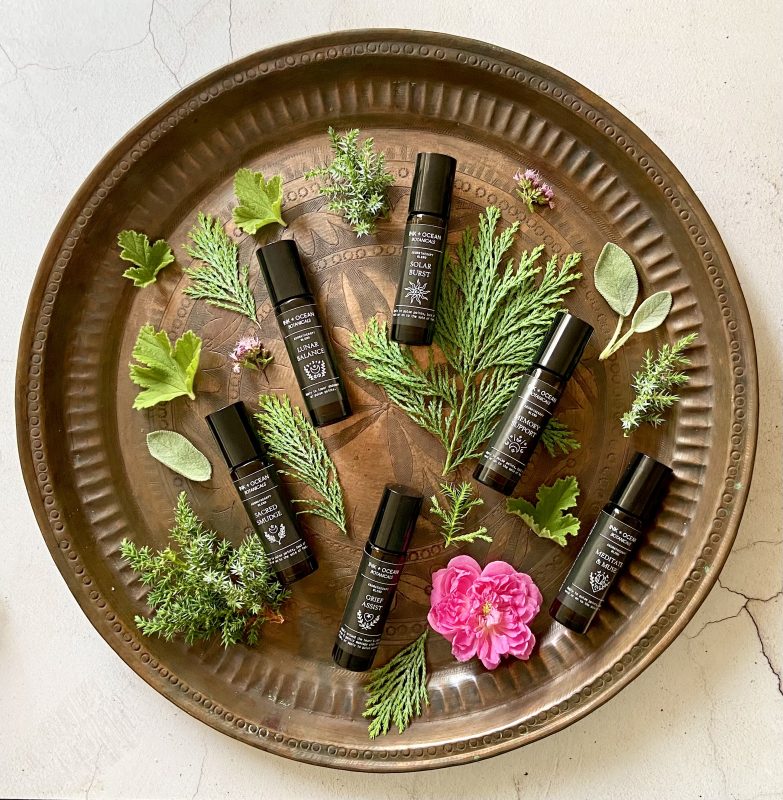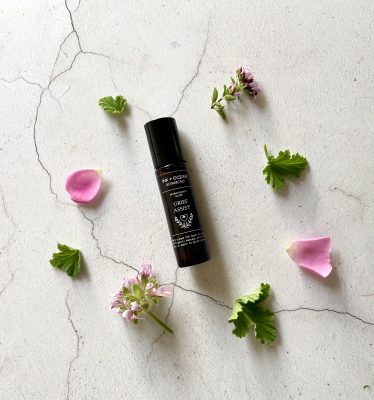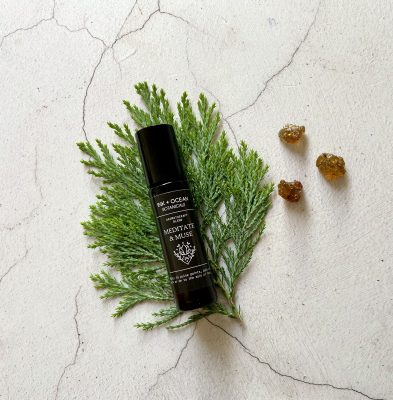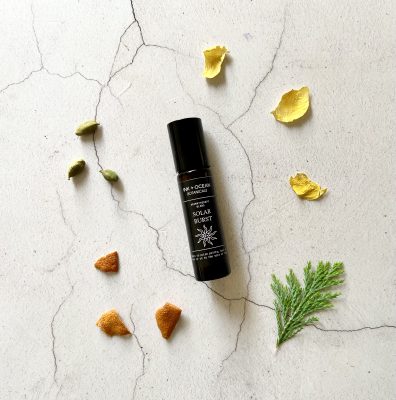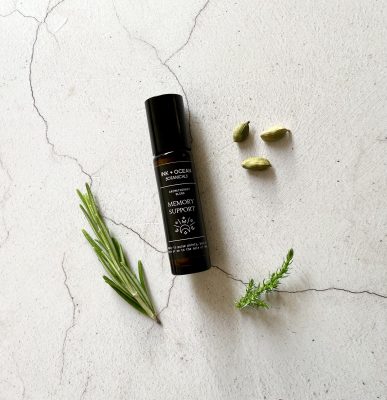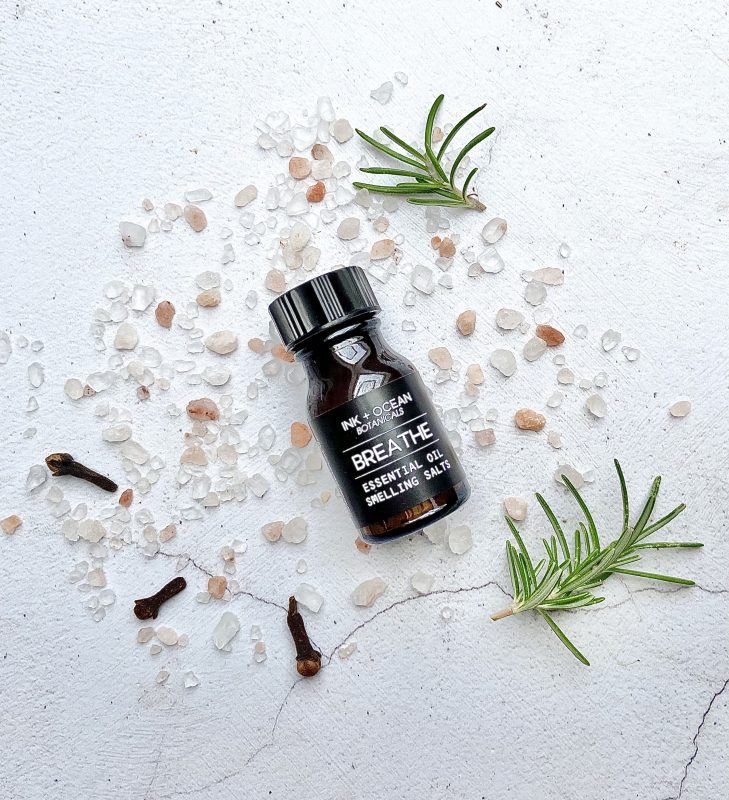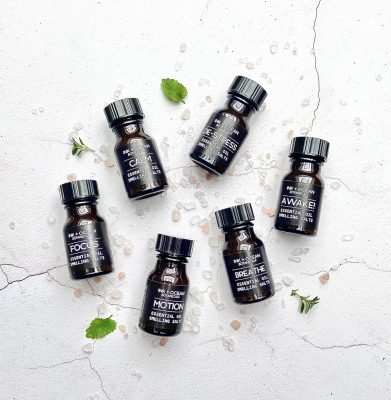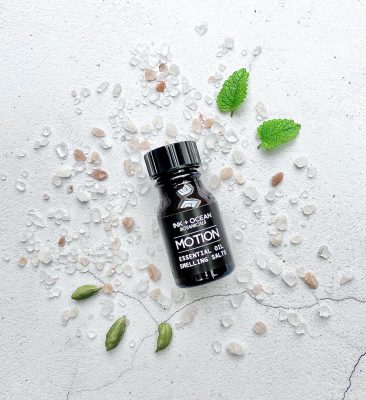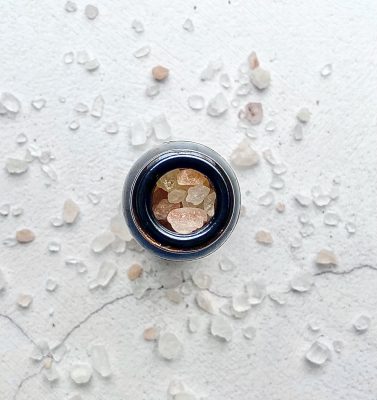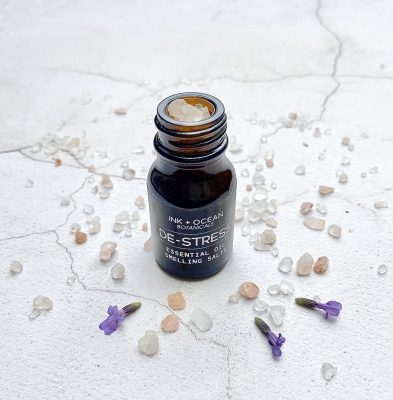New essential oil roller blends that I have been working on! A range of beautiful therapeutic aromatics, diluted in golden jojoba oil. Essential oils not only work on a physiological level but they also have a subtle element that works on the human consciousness. Indeed throughout history aromatic botanicals have been used across many cultures and civilisations for healing the mind, the body and the soul, each of which are intrinsically linked. These six new blends have been carefully and mindfully chosen for their therapeutic, as well as subtle vibrational properties.
Tag Archives: essential oils
New in the shop! These aromatherapy smelling salts are made with pink Himalayan rock salt and a synergistic blend of essential oils to enhance health and wellbeing, and aid common ailments.
Aromatic essential oils have been used for thousands of years as a remedy to enrich health, and has the ability of affect mood and atmosphere. Smelling salts have been used since Roman times as mentioned by Pliny the Elder, and were also popular in the 13th Century, frequently used to trigger consciousness and prevent fainting spells. Similarly, smelling salts are used today by athletes, to enhance their performance.
We have combined these two medicinal tools to create essential oil smelling salts in a handy amber glass apothecary bottle for convenient use. Ideal for the home, your desk at work, or when travelling. These contain NO ammonia and are a simple way to utilise the benefits of aromatherapy.
By Christian Nordqvist
Aromatherapy, or essential oil therapy, refers to a range of traditional, alternative or complementary therapies that use essential oils and other aromatic plant compounds.
Essential oils have been used for nearly 6,000 years, with the aim of improving a person’s health or mood.
The National Association for Holistic Aromatherapy (NAHA) defines aromatherapy as “the therapeutic application or the medicinal use of aromatic substances (essential oils) for holistic healing.”
In 1997, the International Standards Organization (ISO) defined an essential oil as a “product obtained from vegetable raw material, either by distillation with water or steam, or from the epicarp of citrus fruits by a mechanical process, or by dry distillation.”
A range of essential oils have been found to have various degrees of antimicrobial activity and are believed to have antiviral, nematicidal, antifungal, insecticidal, and antioxidant properties. Aromatherapy applications include massage, topical applications, and inhalation. 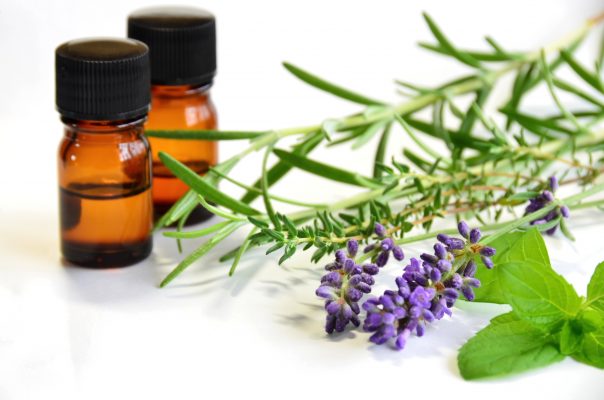
However, users should be aware that “natural” products are also chemicals, and they can be hazardous if used in the wrong way. It is important to follow the advice of a trained professional when using essential oils.
Contents of this article:
Using aromatherapy
What is aromatherapy good for?
What do different essential oils do?
Risks of aromatherapy
Using aromatherapy
[essential oils]
A range of essential oils may help boost health and wellbeing.
Aromatherapy is normally used through inhalation or as a topical application.
Inhalation: the oils evaporate into the air using a diffuser container, spray, or oil droplets, or breathed in, for example, in a steam bath.
Apart from providing a pleasant smell, aromatherapy oils can provide respiratory disinfection, decongestant, and psychological benefits.
Inhaling essential oils stimulates the olfactory system, the part of the brain connected to smell, including the nose and the brain.
Molecules that enter the nose or mouth pass to the lungs, and from there, to other parts of the body.
As the molecules reach the brain, they affect limbic system, which is linked to the emotions, the heart rate, blood pressure, breathing, memory, stress, and hormone balance. In this way, essential oils can have a subtle, yet holistic effect on the body.
Topical applications: massage oils, and bath and skin care products are absorbed through the skin. Massaging the area where the oil is to be applied can boost circulation and increase absorption. Some argue that areas that are richer in sweat glands and hair follicles, such as the head or the palms of the hand, may absorb the oils more effectively.
Essential oils are never applied directly to the skin. They must always be diluted with a carrier oil. Usually, a few drops of essential oil to an ounce of carrier oil is the concentration. Most common carrier oils are sweet almond oil or olive oil.
Always do an allergy test before trying a new essential oil.
To do an allergy test:
Dilute the essential oil in a carrier oil at twice the concentration you plan to use
Rub the mixture into an area the size of a quarter on the inside of the forearm
If there is no allergic response within 24 to 48 hours, it should be safe to use.
Some people report developing allergies to essential oils after using them many times before. If a new allergic response appears, the individual should stop using it immediately and avoid its smell.
To achieve a 0.5 to 1 percent dilution, use 3 to 6 drops of essential oil per ounce of carrier. For a 5 percent dilution, add 30 drops to one ounce of carrier.
A maximum concentration of 5 percent is generally considered safe for adults.
Ingesting, or swallowing, essential oils is not recommended. Taken by mouth, the oils can damage the liver or kidneys.
They can also lead to interactions with other drugs, and they can undergo unexpected changes while in the gut.
What is aromatherapy good for?
Aromatherapy is a complementary therapy. It does not provide a cure for diseases, rashes or illnesses, but it can support conventional treatment of various conditions.
[vapor bath with essential oil]
A eucalyptus vapor bath may relieve symptoms of a cold or flu.
It has been shown to reduce:
Nausea
Pain and body aches
Anxiety, agitation, stress, and depression
Fatigue and insomnia
Muscular aches
Headaches
Circulatory problems
Menstrual problems
Menopausal problems
Alopecia, or hair loss
Some types of psoriasis may find relief with aromatherapy, but a healthcare professional should advise about use and application.
Digestive problems may benefit from peppermint oil, but it should not be ingested.
Tooth ache and mouth sores can be relieved by clove oil, but this, too, should only be applied topically and not swallowed.
Supporters claim that these and a wide range of other complaints respond well to aromatherapy, but not all of the uses are supported by scientific evidence.
What do different essential oils do?
Different oils have different uses and effects.
Basil essential oil is used to sharpen concentration and alleviate some of the symptoms of depression. It may relieve headaches and migraines. It should be avoided during pregnancy.
Bergamot essential oil is said to be useful for the urinary tract and digestive tract. When combined with eucalyptus oil it may help relieve skin problems, including those caused by stress and chicken pox.
[rosemary essential oil]
Rosemary essential oil may benefit the nervous and circulatory systems.
Black pepper essential oil is commonly used for stimulating the circulation, muscular aches and pains, and bruises. Combined with ginger essential oil, it is used to reduce arthritis pain and improve flexibility.
Chamomile essential oil can treat eczema
Citronella essential oil is a relative of lemongrass and acts as an insect repellent
Clove essential oil is a topical analgesic, or painkiller, that is commonly used for toothache. It is also used as an antispasmodic antiemetic, for preventing vomiting and nausea, and as a carminative, preventing gas in the gut. It has antimicrobial, antioxidant and antifungal properties.
Eucalyptus essential oil can help relieve the airways during a cold or flu. It is often combined with peppermint. Many people are allergic to eucalyptus, so care should be taken.
Geranium essential oil can be used for skin problems, to reduce stress, and as a mosquito repellant.
Jasmine essential oil has been described as an aphrodisiac. While scientific evidence is lacking, research has shown that the odor of jasmine increases beta waves, which are linked to alertness. As a stimulant, it might increase penile blood flow.
Lavender essential oil is used as an antiseptic for minor cuts and burns and to enhance relaxation and sleep. It is said to relieve headache and migraine symptoms.
Lemon essential oil is said to improve mood, and to help relieve the symptoms of stress and depression.
Rosemary essential oil may promote hair growth, boost memory, prevent muscle spasms, and support the circulatory and nervous systems.
Sandalwood essential oil is believed by some to have aphrodisiac qualities.
Tea tree essential oil is said to have antimicrobial, antiseptic, and disinfectant qualities. It is commonly used in shampoos and skin care products, to treat acne, burns, and bites. It features in mouth rinses but it should never be swallowed, as it is toxic.
Thyme essential oil is said to help reduce fatigue, nervousness, and stress.
Yarrow essential oil is used to treat symptoms of cold and flu, and to help reduce joint inflammation.
Oil for a massage will be mixed with a “carrier oil” that dilutes the oil and provides lubrication.
What to expect during a visit to an aromatherapist
The aromatherapist should take a thorough medical history, and a lifestyle, diet, and current health history.
Aromatherapy involves a holistic approach, so it aims to treat the whole person. Treatments will be suited to the individual’s physical and mental needs. Based on these needs, the aromatherapist may recommend a single oil or a blend.
Depending on patient needs and preferences, the practitioner may recommend a single oil or a blend.
According to the National Cancer Institute (NCI), aromatherapy products do not need FDA approval as long as there is no claim that they treat a specific disease.
An aromatherapist is not the same as a massage therapist, although a massage therapist may use aromatherapy oils.
Cautions and risks
Each essential oil has its own chemical makeup and reason for use, so it is important to speak with a trained aromatherapist, nurse, doctor, physical therapist, massage therapist or pharmacist before applying or using an oil for healing purposes.
A trained professional can recommend and teach how to use each product, giving proper instructions on application or dilution.
Consumers should also be aware that the U.S. Food and Drug Administration does not monitor aromatherapy products, so it can be difficult to know whether or not a product is pure or if it is contaminated or synthetic.
Some beauty and household products, such as lotions, make-up, and candles contain products that may appear to be essential oils, but they are really synthetic fragrances.
Like medications, essential oils must be treated with respect. It is important to seek professional advice and to follow instructions carefully.
Risks of using essential oils
Since essential oils cause reactions in the body, not all the oils will benefit everyone. Chemical compounds in essential oils can produce adverse effects when combined with medications. They may reduce the effectiveness of conventional drugs, or they may exacerbate health conditions in the individual.
A person with high blood pressure, for example, should avoid stimulants, such as rosemary. Some compounds, such as fennel, aniseed, and sage act similarly to estrogen, so a person with an estrogen-dependent breast or ovarian tumor should avoid these.
Concentrated products may be poisonous before dilution and should be handled with care. A maximum concentration of 5 percent is recommended.
Some oils produce toxins which can cause damage to the liver, kidneys, and nervous system, especially if taken internally. Swallowing essential oils can be hazardous, and fatal in some cases.
Individuals with any of the following conditions should be extra careful when using aromatherapy:
An allergy, or allergies
Hay fever, a type of allergy
Asthma
Skin conditions such as eczema or psoriasis
People with the following conditions must be extremely cautious:
Epilepsy
Hypertension, or high blood pressure
If the oil is to be mixed with a carrier, the individual should tell the aromatherapist or massage therapist about any nut allergies, because carrier oils are often obtained from nuts and seeds.
Aromatherapy can have side effects, but these are normally mild and do not last long.
They include:
Nausea
Headaches
Some allergic reactions
Use of aromatherapy by pregnant or nursing mothers has not been proven safe by research, so it is not recommended.
During the first trimester of pregnancy, aromatherapy may pose a risk to the developing fetus. Women who are breastfeeding should avoid peppermint essential oil, as it may be expressed in breast milk.
Essential oils derived from citrus may make the skin more sensitive to ultraviolet light, increasing the risk of sunburn.
Some oils may affect the function of conventional medicines, so people who are using medications of any type should first check with a qualified pharmacist or doctor.
Finally, when storing essential oils, it is important to be aware that light, heat, and oxygen can affect the integrity of the oil. Products should come from a respected and trustworthy source, to be sure of the quality. Following instructions carefully reduces the risk of compromising the user’s health.
In parts of Western Europe aromatherapy is incorporated into mainstream medicine as an antiseptic, antiviral, antifungal and antibacterial therapy. In the United States and Canada, this is less so. In France, some essential oils are regulated as prescription drugs, and they can only be administered or prescribed by a doctor.
Aromatherapy can help alleviate some conditions, but it should be used correctly, under the supervision of a qualified practitioner. The NAHA can advise on aromatherapists in your area, and some are members of a professional association, but until now there are no licensing boards for aromatherapists in the U.S.
Source: http://www.medicalnewstoday.com
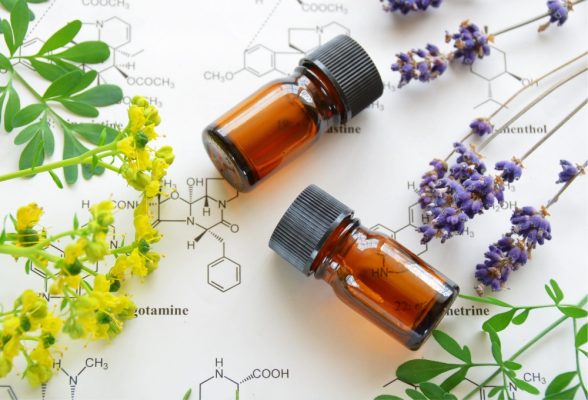 “Nowadays, use of alternative and complementary therapies with mainstream medicine has
“Nowadays, use of alternative and complementary therapies with mainstream medicine has
gained the momentum. Aromatherapy is one of the complementary therapies which use
essential oils as the major therapeutic agents to treat several diseases. The essential or
volatile oils are extracted from the flowers, barks, stem, leaves, roots, fruits and other parts
of the plant by various methods. It came into existence after the scientists deciphered the
antiseptic and skin permeability properties of essential oils.”
Read the rest of the paper here

